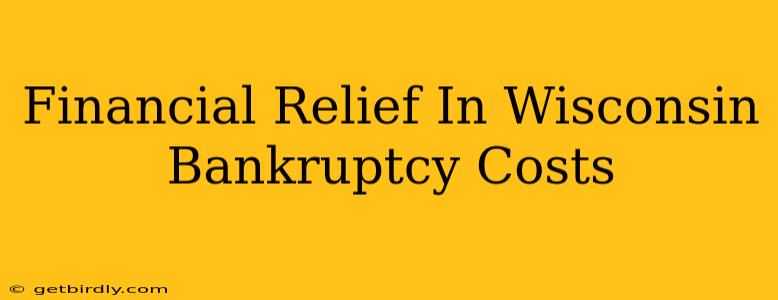Financial Relief in Wisconsin: Understanding Bankruptcy Costs
Facing overwhelming debt can feel incredibly isolating and stressful. If you're a Wisconsin resident considering bankruptcy as a path to financial relief, understanding the associated costs is crucial for making an informed decision. This article breaks down the various expenses involved in filing for bankruptcy in Wisconsin, helping you navigate this complex process with clarity.
What are the typical costs of filing for bankruptcy in Wisconsin?
The cost of bankruptcy in Wisconsin isn't a fixed amount; it varies depending on several factors, including the type of bankruptcy filed (Chapter 7 or Chapter 13), the complexity of your financial situation, and the attorney you choose. However, you should expect to pay several key fees:
- Filing Fees: The court charges a filing fee for each bankruptcy petition. These fees are set by the federal government and are the same across the state. These fees can change over time, so it’s important to check the most recent fee schedule with the U.S. Bankruptcy Court for the Eastern District of Wisconsin or the Western District, as applicable, based on your location.
- Attorney Fees: This is often the most significant cost. Bankruptcy attorneys charge by the hour or may offer a flat fee depending on the complexity of your case. The attorney's fees will cover their time spent preparing your paperwork, representing you in court, and negotiating with your creditors. Shop around and get quotes from multiple attorneys before making a decision.
- Credit Counseling: Before filing for Chapter 7 bankruptcy, you're required to complete a credit counseling course from an approved agency. There's typically a fee for this course, though some agencies offer payment plans or reduced fees for those experiencing financial hardship.
- Debt Counseling (Chapter 13): If you're filing for Chapter 13 bankruptcy, you will also need to complete a debt counseling course from an approved agency. The fee structure is similar to that of credit counseling.
- Other potential costs: Depending on your situation, you might also incur expenses for things like document preparation, credit report purchases, or travel to court appearances.
How much does a Chapter 7 bankruptcy cost in Wisconsin?
Chapter 7 bankruptcy, also known as liquidation bankruptcy, typically involves selling non-exempt assets to pay off creditors. The total cost for a Chapter 7 filing can range from a few thousand dollars to significantly more, depending on your individual situation and the attorney's fees. Remember, this includes the court filing fees, attorney fees, and the credit counseling fees.
How much does a Chapter 13 bankruptcy cost in Wisconsin?
Chapter 13 bankruptcy, also known as reorganization bankruptcy, involves creating a repayment plan to pay back your debts over a period of three to five years. The costs associated with Chapter 13 are usually higher than Chapter 7 because it's a more complex process, requiring more legal work and court appearances. The total cost will encompass court filing fees, attorney fees, and debt counseling fees.
Can I file for bankruptcy without an attorney in Wisconsin?
While it's possible to file for bankruptcy pro se (without an attorney) in Wisconsin, it's strongly discouraged. Bankruptcy law is incredibly complex, and making a mistake could have serious consequences. An experienced bankruptcy attorney can guide you through the process, ensure your paperwork is correctly filed, and represent your interests in court. The potential cost savings from representing yourself may be outweighed by the risks involved.
What are some ways to reduce the cost of bankruptcy in Wisconsin?
- Seek free or low-cost legal aid: Organizations like Legal Aid Society of Milwaukee may offer assistance to those who qualify based on income.
- Compare attorney fees: Get quotes from several bankruptcy attorneys to compare their fees and services.
- Negotiate fees: Discuss payment plans or potential discounts with your attorney.
How can I find a reputable bankruptcy attorney in Wisconsin?
The State Bar of Wisconsin website is a good resource to find attorneys licensed to practice in the state. You can also ask for referrals from friends, family, or financial advisors. Before hiring an attorney, thoroughly research their experience with bankruptcy cases and read online reviews.
What happens if I can't afford the costs of bankruptcy?
If you're struggling to afford the costs of bankruptcy, explore options like payment plans with your attorney, seeking legal aid, or exploring other debt relief solutions. It's crucial to have an open and honest conversation with a bankruptcy attorney to discuss your financial situation and explore the best path forward.
This information is for general educational purposes only and does not constitute legal advice. Always consult with a qualified bankruptcy attorney in Wisconsin to discuss your specific circumstances and legal options.

